Jing-Jia Luo
EarthLink: A Self-Evolving AI Agent for Climate Science
Jul 24, 2025


Abstract:Modern Earth science is at an inflection point. The vast, fragmented, and complex nature of Earth system data, coupled with increasingly sophisticated analytical demands, creates a significant bottleneck for rapid scientific discovery. Here we introduce EarthLink, the first AI agent designed as an interactive copilot for Earth scientists. It automates the end-to-end research workflow, from planning and code generation to multi-scenario analysis. Unlike static diagnostic tools, EarthLink can learn from user interaction, continuously refining its capabilities through a dynamic feedback loop. We validated its performance on a number of core scientific tasks of climate change, ranging from model-observation comparisons to the diagnosis of complex phenomena. In a multi-expert evaluation, EarthLink produced scientifically sound analyses and demonstrated an analytical competency that was rated as comparable to specific aspects of a human junior researcher's workflow. Additionally, its transparent, auditable workflows and natural language interface empower scientists to shift from laborious manual execution to strategic oversight and hypothesis generation. EarthLink marks a pivotal step towards an efficient, trustworthy, and collaborative paradigm for Earth system research in an era of accelerating global change. The system is accessible at our website https://earthlink.intern-ai.org.cn.
FengWu-W2S: A deep learning model for seamless weather-to-subseasonal forecast of global atmosphere
Nov 15, 2024Abstract:Seamless forecasting that produces warning information at continuum timescales based on only one system is a long-standing pursuit for weather-climate service. While the rapid advancement of deep learning has induced revolutionary changes in classical forecasting field, current efforts are still focused on building separate AI models for weather and climate forecasts. To explore the seamless forecasting ability based on one AI model, we propose FengWu-Weather to Subseasonal (FengWu-W2S), which builds on the FengWu global weather forecast model and incorporates an ocean-atmosphere-land coupling structure along with a diverse perturbation strategy. FengWu-W2S can generate 6-hourly atmosphere forecasts extending up to 42 days through an autoregressive and seamless manner. Our hindcast results demonstrate that FengWu-W2S reliably predicts atmospheric conditions out to 3-6 weeks ahead, enhancing predictive capabilities for global surface air temperature, precipitation, geopotential height and intraseasonal signals such as the Madden-Julian Oscillation (MJO) and North Atlantic Oscillation (NAO). Moreover, our ablation experiments on forecast error growth from daily to seasonal timescales reveal potential pathways for developing AI-based integrated system for seamless weather-climate forecasting in the future.
ORCA: A Global Ocean Emulator for Multi-year to Decadal Predictions
May 24, 2024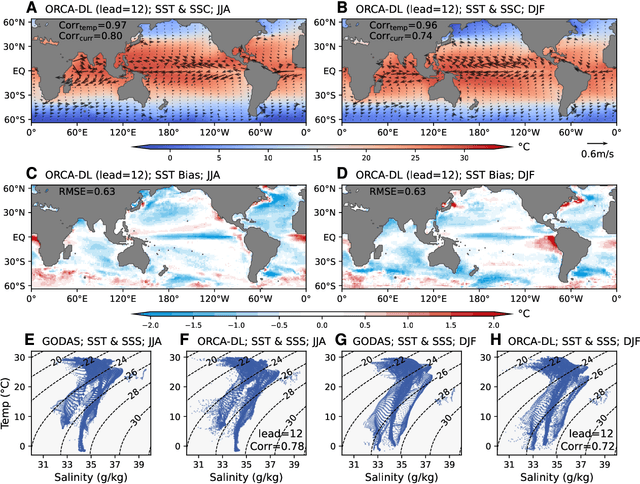
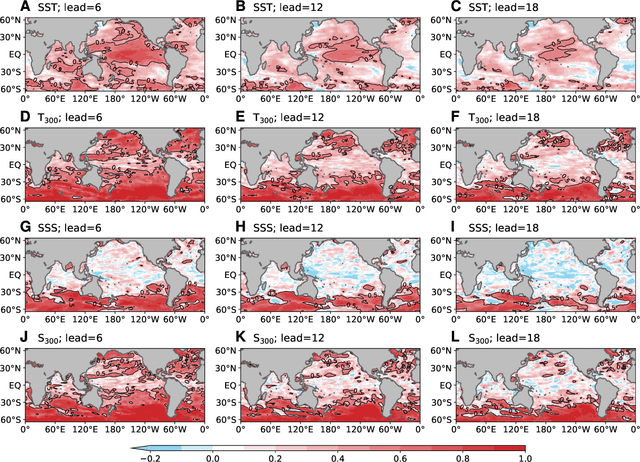
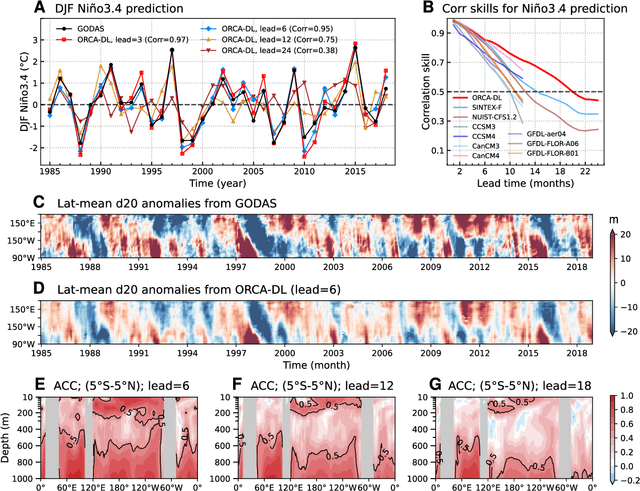
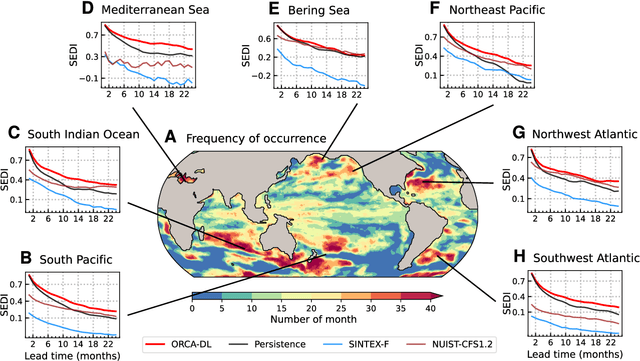
Abstract:Ocean dynamics plays a crucial role in driving global weather and climate patterns. Accurate and efficient modeling of ocean dynamics is essential for improved understanding of complex ocean circulation and processes, for predicting climate variations and their associated teleconnections, and for addressing the challenges of climate change. While great efforts have been made to improve numerical Ocean General Circulation Models (OGCMs), accurate forecasting of global oceanic variations for multi-year remains to be a long-standing challenge. Here, we introduce ORCA (Oceanic Reliable foreCAst), the first data-driven model predicting global ocean circulation from multi-year to decadal time scales. ORCA accurately simulates the three-dimensional circulations and dynamics of the global ocean with high physical consistency. Hindcasts of key oceanic variables demonstrate ORCA's remarkable prediction skills in predicting ocean variations compared with state-of-the-art numerical OGCMs and abilities in capturing occurrences of extreme events at the subsurface ocean and ENSO vertical patterns. These results demonstrate the potential of data-driven ocean models for providing cheap, efficient, and accurate global ocean modeling and prediction. Moreover, ORCA stably and faithfully emulates ocean dynamics at decadal timescales, demonstrating its potential even for climate projections. The model will be available at https://github.com/OpenEarthLab/ORCA.
Is Artificial Intelligence Providing the Second Revolution for Weather Forecasting?
Jan 30, 2024Abstract:The rapid advancement of artificial intelligence technologies, particularly in recent years, has led to the emergence of several large parameter artificial intelligence weather forecast models. These models represent a significant breakthrough, overcoming the limitations of traditional numerical weather prediction models and indicating a potential second revolution for weather forecast. This study explores the evolution of these advanced artificial intelligence forecast models, and based on the identified commonalities, proposes the "Three Large Rules" for their development. We discuss the potential of artificial intelligence in revolutionizing numerical weather prediction, briefly outlining the underlying reasons for this potential. Additionally, we explore key areas for future development prospects for large artificial intelligence weather forecast models, integrating the entire numerical prediction process. Through an example that combines a large artificial intelligence model with ocean wave forecasting, we illustrate how forecasters can adapt and leverage the advanced artificial intelligence model. While acknowledging the high accuracy, computational efficiency, and ease of deployment of large artificial intelligence forecast models, we emphasize the irreplaceable values of traditional numerical forecasts. We believe that the optimal future of weather forecasting lies in achieving a seamless integration of artificial intelligence and traditional numerical models. Such a synthesis is anticipated to offer a more comprehensive and reliable approach for future weather forecasting.
ResoNet: Robust and Explainable ENSO Forecasts with Hybrid Convolution and Transformer Networks
Dec 16, 2023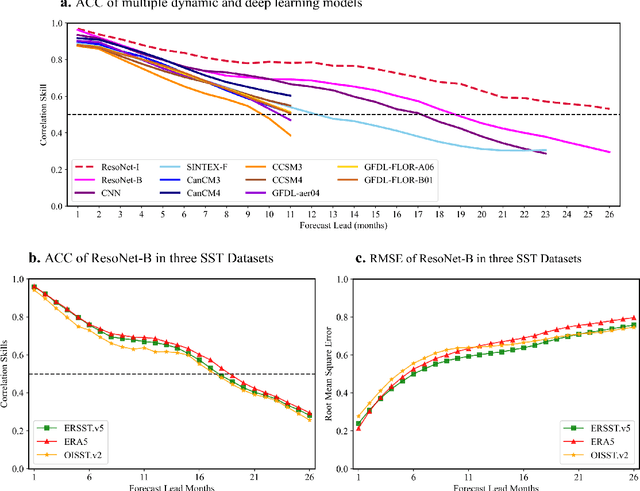
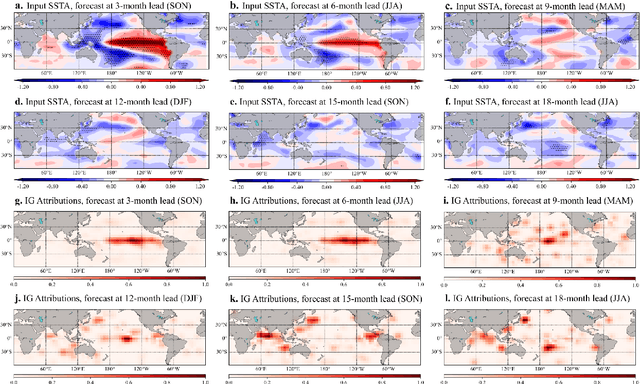
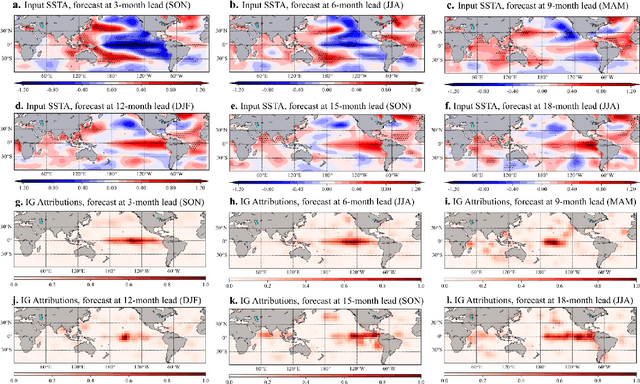
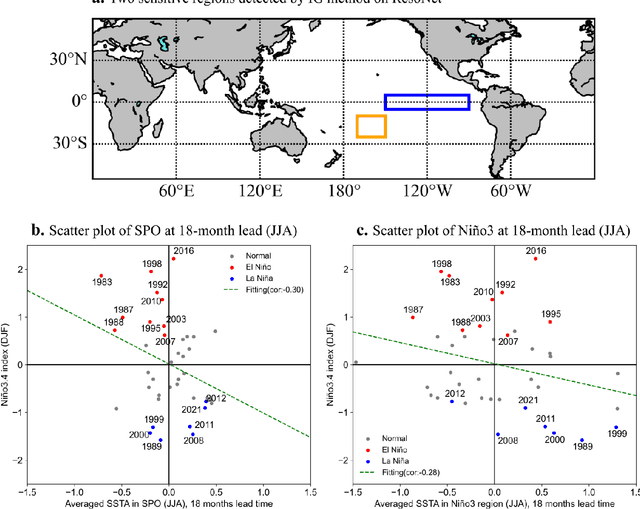
Abstract:Recent studies have shown that deep learning (DL) models can skillfully predict the El Ni\~no-Southern Oscillation (ENSO) forecasts over 1.5 years ahead. However, concerns regarding the reliability of predictions made by DL methods persist, including potential overfitting issues and lack of interpretability. Here, we propose ResoNet, a DL model that combines convolutional neural network (CNN) and Transformer architectures. This hybrid architecture design enables our model to adequately capture local SSTA as well as long-range inter-basin interactions across oceans. We show that ResoNet can robustly predict ESNO at lead times between 19 and 26 months, thus outperforming existing approaches in terms of the forecast horizon. According to an explainability method applied to ResoNet predictions of El Ni\~no and La Ni\~na events from 1- to 18-month lead, we find that it predicts the Ni\~no3.4 index based on multiple physically reasonable mechanisms, such as the Recharge Oscillator concept, Seasonal Footprint Mechanism, and Indian Ocean capacitor effect. Moreover, we demonstrate that for the first time, the asymmetry between El Ni\~no and La Ni\~na development can be captured by ResoNet. Our results could help alleviate skepticism about applying DL models for ENSO prediction and encourage more attempts to discover and predict climate phenomena using AI methods.
FengWu: Pushing the Skillful Global Medium-range Weather Forecast beyond 10 Days Lead
Apr 06, 2023



Abstract:We present FengWu, an advanced data-driven global medium-range weather forecast system based on Artificial Intelligence (AI). Different from existing data-driven weather forecast methods, FengWu solves the medium-range forecast problem from a multi-modal and multi-task perspective. Specifically, a deep learning architecture equipped with model-specific encoder-decoders and cross-modal fusion Transformer is elaborately designed, which is learned under the supervision of an uncertainty loss to balance the optimization of different predictors in a region-adaptive manner. Besides this, a replay buffer mechanism is introduced to improve medium-range forecast performance. With 39-year data training based on the ERA5 reanalysis, FengWu is able to accurately reproduce the atmospheric dynamics and predict the future land and atmosphere states at 37 vertical levels on a 0.25{\deg} latitude-longitude resolution. Hindcasts of 6-hourly weather in 2018 based on ERA5 demonstrate that FengWu performs better than GraphCast in predicting 80\% of the 880 reported predictands, e.g., reducing the root mean square error (RMSE) of 10-day lead global z500 prediction from 733 to 651 $m^{2}/s^2$. In addition, the inference cost of each iteration is merely 600ms on NVIDIA Tesla A100 hardware. The results suggest that FengWu can significantly improve the forecast skill and extend the skillful global medium-range weather forecast out to 10.75 days lead (with ACC of z500 > 0.6) for the first time.
 Add to Chrome
Add to Chrome Add to Firefox
Add to Firefox Add to Edge
Add to Edge